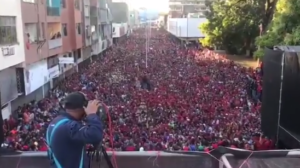On Feb. 2 a massive rally was held in Venezuela’s capital city, Caracas, in support of the Venezuelan government and its democratically elected President Nicolás Maduro. The outpouring of support for Maduro is a decisive rebuke of the U.S.-backed plans for regime change and their support for Juan Guaidó. Until two weeks ago, Guaidó was unknown to virtually the whole Venezuelan population. The major media outlets in the United States completely ignored the pro-Maduro rally, while mentioning only the opposition rallies.
The rally was held on the 20-year anniversary of Hugo Chávez’s first inauguration. Chávez was tremendously popular with the working class, poor and oppressed people of Venezuela and the start of his presidency marked the beginning of the Bolivarian Revolution — the process of social transformation that has put Venezuela on the road to socialism. Starting with a new constitution the very same year, ratified by overwhelming popular vote, Bolivarian Venezuela has brought about major gains in eliminating illiteracy, providing more than 2.5 million homes to the poor at little or no cost, and social spending on a scale never seen before. It in turn inspired progressive and leftist governments throughout Central and South American countries.
But the U.S. would not accept this nor respect any other election held under the Bolivarian process. On April 11, 2002, Chávez was taken captive in a U.S.-backed coup. In an unprecedented show of people’s power, he was returned to power two days later by tens of thousands of Venezuelans demanding his return. Since then the U.S. has pursued an aggressive campaign with an economic war, sanctions and military threats against the government, whose goal is socialism.
Saturday’s Feb. 2nd massive rally brought together a militant and united throng of hundreds of thousands of Venezuelans, not just in Caracas but across Venezuela. Pictures on social media show tens of thousands stretched as far as the eye can see down three major avenues in Caracas. Major pro-government rallies were also held in Maturín, Monagas, Guanare, Valencia and Cúa on Feb. 1.
There have also been actions in solidarity with Venezuela around the world. The ANSWER Coalition along with a wide range of U.S. progressive, anti-war, anti-imperialist and groups in favor of Venezuelan sovereignty are calling for a national march in front of the White House on Saturday, March 16. They are demanding U.S. hands off of Venezuela, No Coup, No Sanctions and No U.S. Intervention and War.

Corporate media at the service of U.S. empire
The intent of the media censorship against pro-Maduro sentiment is to create the idea that the U.S. government, Canada and European powers are speaking for the Venezuelan people in seeking the overthrow of President Maduro. But this is a total lie and manipulation of the facts that accompanies the political manipulation by the U.S. and its allies.
The major newspapers including the New York Times, Washington Post, Los Angeles Times, The Miami Herald and others give scant, if any, mention to the pro-government rallies. It is the same for CNN, Fox News, MSNBC and other television broadcast news stations. National Public Radio is equally complicit in distorting the reality. The lead article on Venezuela in the New York Times on February 3 titled “Venezuelans Opposed to Maduro Pour Into Streets for Day of Protests” all but ignored the massive pro-Maduro rallies.
The media’s self-censorship extends to social media. Last week it was revealed Twitter had deleted thousands of accounts it identified as “engaging in a state-backed influence campaign” in support of Venezuela. Facebook was criticized for its attempt to label an article from a major news outlet in Cuba, “Venezuela is not alone” as spam and block it from being shared on its platform.
While addressing the rally on Feb. 2 Maduro called for a new round of National Assembly elections. He stated that the National Constituent Assembly — a different legislative body that was elected in 2017 and has the power to rewrite the constitution — is considering the potential for new parliamentary elections and stated, referring to the opposition, “Do they want elections? We will hold a parliamentary election.” Maduro also questioned the opposition’s intentions after his repeated attempts at talks were turned down saying, “We’re for dialogue and they’re rejecting dialogue. If you’re rejecting dialogue what are you for? War?” Maduro said that the government wants peace and is preparing all its forces to defend the peace.
There is a reason for his comment. The U.S. government has not ruled out a military option. In an interview on Face the Nation when asked what it would take for him to use military force, Trump responded, “Well, I don’t want to say that, but certainly it’s something that on the — it’s an option.”
Guaidó himself has refused to rule out support for a U.S. invasion of his own country. When talking with CNN’s Christiane Amanpour he said he was “appreciative” of Donald Trump’s support and that he would accept “whatever pressure is necessary,” referring to U.S. military support. Many of those in the opposition protests have also carried U.S. flags and thanked Trump for his support.



